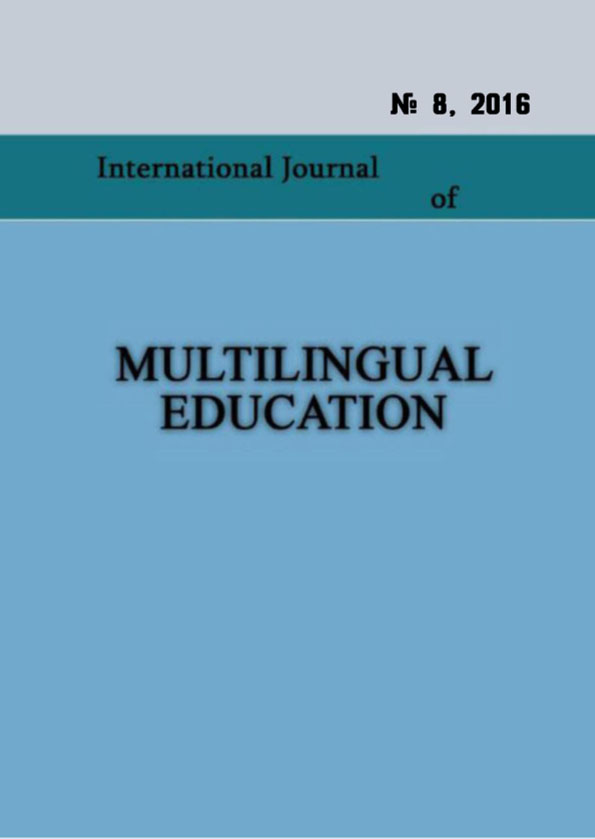Rethinking Integration Policy – Dual Ethnic and Cultural Identity
Keywords:
Ethnic minority groups; Cultural identity; ethnic identity; integration;Abstract
The paper sheds light into the general facts and situation related to ethnic minority groups living in Georgia. While providing the small-scale survey of 280 ethnic minority students enrolled in Georgian language preparatory program of 5 higher education institutions of Georgia we argue the factors which play decisive role in successful inclusion of ethnic minorities in Georgian society. These factors include the identity and self-identification perceptions of ethnic minority groups and an acceptance of these perceptions by the dominant group. The study provides information about the positioning of ethnic minority students towards their cultural and ethnic identity, and about their perceptions regarding their belonging to Georgia. According to the results sufficient space and favourable ground for developing of duel ethnic and cultural identity among the ethnic minority groups are available. Referring to the results a meaningful concept for an integration of ethnic minority population is introduced for further discourse.
References
Bar-Gill, S., Fershtman, C., Integration policy: Cultural transmission with endogenous fertility, Journal of Population Economics, 2008, 29(1)
BAUBÖCK, R, International migration and liberal democracies: the challenge of integration, in: Patters of Prejudice, 2001, 35(4), 33-49, Routledge
Berry, J. W., Kim, U., Power, s., et, Acculturation Attitudes in Plural Societies, Applied Psychology: An International Review, 1989, 38 (2), 185-206
Cebotari, V., National Pride among Ethnic Minority and Majority Groups in Europe. A Comparative Evidence from the European Values Survey, from the conference materials of IMPALLA/ESPANET Conference, Luxembourg, March 6-7, 2009
Cohen, E., Jewish identity research: A state of the art, International Journal of Jewish Education Research, 2010 (1), 7-48
Grigule, L., Georgia Minority Education Reform: from Local Initiatives towards State Planned Minority Education Reform, Bilingual Education, 2010, 2, 31-43;
National Statistic Office of Georgia, Data on census 2014, http://geostat.ge/index.php?action=0&lang=eng
Johns, M., "Old" and "New" Minorities within the EU: The Growing Need for Policies on Social Cohesion, Prepared for the European Consortium for Political Research’s Fifth Pan-European Conference on EU Politics, Porto, Portugal, June 2010, http://www.jhubc.it/ecpr-porto/virtualpaperroom/006.pdf
KURAN, T and SANDHOLM W.H., Cultural Integration and Its Discontents, Review of Economic Studies (2008) 75, 201–228
Mekhuzla, S., Roche, A., National Minorities and Educational Reform In Georgia, Working paper # 46, EUROPEAN CENTRE FOR MINORITY ISSUES (ECMI), 2009
Office of Ombudsman, SECOND REPORT SUBMITTED BY GEORGIA PURSUANT TO ARTICLE 25, PARAGRAPH 2 OF THE FRAMEWORK CONVENTION FOR THE PROTECTION OF NATIONAL MINORITIES, Council of Europe, 2012, 6, 42-48, 98-122 https://www.coe.int/t/dghl/monitoring/minorities/3_fcnmdocs/PDF_2nd_SR_ Georgia_en.pdf
Office of the State Minister of Georgia for Reconciliation and Civic Equality, Assessment document on the Implementation of the National Concept on Tolerance and Civic Integration and Action Plan for 2009-2014, Office of the State Minister of Georgia for Reconciliation and Civic Equality, 2014, 27-80 http://www.smr.gov.ge/Uploads/Assessment_17cd328e.pdf
PLASSERAUD, Y., Cultural diversity, Multilingualism and Ethnic minorities in Sweden, conference materials from the international conference: National minorities/New minorities. What similarities and differences in contemporary Europe?, 2-3 September 2009 – Stockholm, Sweden
Schwartz, S. J., Zamboanga, B. L., Testing Berry’s Model of Acculturation: A Confirmatory Latent Class Approach, Cultural Diversity and Ethnic Minority Psychology, 2008, 14 (4), 275–285
Tabatadze, The Factors Influencing the Effectiveness of Bilingual Educational Programs; the Prospects of Pilot Bilingual Educational Programs in Georgia, Conference materials of the international conference: Issues of State Language Teaching; Problems and Challenges, TSU, CCIIR, 2011, 288-303
Tabatadze S., Gorgadze, N,. Intercultural Education Research in Primary Grades of Georgia, Research Report, Centre for Civil Integration and Inter-Ethnic Relations, 2013, http://cciir.ge/upload/editor/file/jurnali%20%20bilingvuri%20/politikis%20dokumentebi
%20/geo/axali/PUB2_ENG_PRINT_edited_new_table%20final_10_01_2014.pdf
Tabatadze, S., Gorgadze, N,. EVALUATION OF THE EFFECTIVENESS OF THE QUOTA SYSTEM IN GEORGIA, Research report, Centre for Civil Integration and Inter-Ethnic Relations, Tbilisi, 2013, http://cciir.ge/upload/editor/file/jurnali%20%20bilingvuri%20/politikis%20dokumentebi%20/geo/axali/PUB1_ENG_.pdf
Tabatadze, S., Gorgadze, N., Research of intercultural Education Aspects in Teacher Education Programs of Higher Education Institutions of Georgia, Research Report, Centre for Civil Integration and Inter-Ethnic Relations, 2014, http://cciir.ge/upload/editor/file/jurnali%20%20bilingvuri%20/politikis%20dokumentebi%20/geo/axali/interkulturuli%20umaglesebshi.pdf
Tabatadze, S., Gorgadze, N,. Equal opportunities for Professional Development and Carrier Growth of Teachers of Non-Georgian Schools, policy paper, Centre for Civil Integration and Inter-Ethnic Relations, 2015. http://cciir.ge/upload/editor/file/jurnali%20%20bilingvuri%20/axali%20dokumenti.pdf
The State Civil equity and integration strategy and action plan for 2015-2020, https://matsne.gov.ge/ka/document/view/2958879
UN Association of Georgia, National Integration and Tolerance in Georgia, Research report, program: National Integration and Tolerance in Georgia Program (NITG),2008 http://una.ge/uploads/publications/49/NITG_Assesment_survey_report_Report.pdf
UN Association of Georgia, Data retrieved from the draft report of research-study implemented within the program of “Support of Tolerance, Civil Awareness and integration in Georgia”
Published
How to Cite
Issue
Section
License
Copyright (c) 2016 Natia Gorgadze

This work is licensed under a Creative Commons Attribution-NonCommercial 4.0 International License.
Copyright (c) - Authors who publish with this journal agree to the following terms: Authors retain copyright and grant the journal the right of first publication with the work simultaneously licensed under a Creative Commons Attribution-Noncommercial 4.0 International License, which allows others to share the work with an acknowledgement of the work's authorship and initial publication in this journal. Authors are permitted and encouraged to post their work online (e.g., in institutional repositories or on their personal website) prior to and during the submission process, as it can lead to productive exchanges, as well as earlier and greater citation of published work (see The Effect of Open Access). Authors may enter into separate, additional contractual arrangements for the non-exclusive distribution of the journal's published version of the work (e.g., post it to a repository or publish it in a book), with an acknowledgement of its initial publication in this journal.

